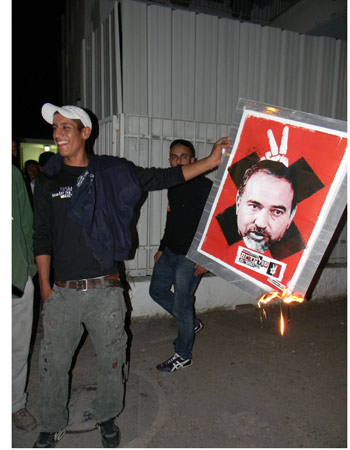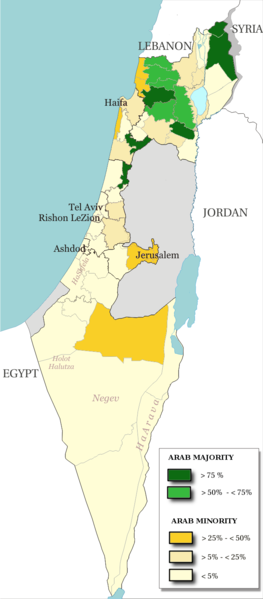In Lod yesterday, Israeli Arabs and liberal Israelis demonstrated in commemoration of Land Day – an Israeli Arab and Palestinian day to protest the seizure of private Arab land by the Israeli state. But it has taken on more significance this year. That is not because of the protetss sweeping the Arab world, but regardingthis week’s passing of the citizenship law sponsored by Yisrael Beitenu. What was unique about the demonstration was the presence of effigies – images – of a certain politician. In particular, Avigdor Lieberman, whose face was set alight on the posters carrying his punim.
Two years ago, J Street released a video ad immediately after the Israeli elections that condemned Avigdor Lieberman as a staunch nationalist and a racist. His statements have not been so far removed from those of his coalition partners – even members of the opposition! But his actions and the actions of his party have backed up this view. His party has sponsored a bill that has just passed, allowing citizenship to be revoked from anyone found guilty of treason or espionage.
At the same time, Lieberman has personally advocated his own version of a two-state solution that recommends trading Arab towns in Israel for Jewish towns in the West Bank. In the context of other statements he has made, this seems to be born more out of distaste for Arabs than strategic thought. In fact, it contradicts historic, traditional Israeli strategic thinking. Since the West Bank juts into Israel in such a way that Israel’s north and southern regions are only connected by a thin strip of land, there has always been worry invading Arab armies would aim for that thin strip in order to cut israel into two during a war. It was in fact Iraqi strategy during the War of Independence (when Iraqi troops were stationed in Nablus, the northern West Bank.
Arab Areas in Israel by Proportion
Land Day though is significant. It has become an annual day of protest, but it is relatively young. The Israeli state has been expropriating land since the state’s inception, particularly in the north. Land Day though goes back to 1976, when a specific attempt to implement eminent domain led to mass protests.
Up until that point, the Arab minority of Israel remained relatively passive to current events. In fact, Arabs in Nazareth are known to have thrown flowers at Israeli troops heading to the Golan front during the Yom Kippur War.
In my very humble opinion, private property is more of a factor in the Israeli-Palestinian conflict than experts let on – or realize. It plays on both sides of the aisle – Jewish and Arab. Despite what you might think about settlers, the reality is settlers often purchase land either from the Israeli government or from private Palestinian owners.
When claiming government land, the state uses the same legal precedents as did the Jordanians (when they controlled the west Bank 1948-1967), the British (who controlled it from 1917-1948) and the Ottoman Empire (out of commission by the end of World War I. It usually means that the land has not been cultivated or built on in at least three years, making the land hefker – owner-less.
Palestinians do sell private land. This is why the Palestinian Authority authorizes the death penalty for anyone selling land to Jews (there would be no law if it did not actually happen). Landsellers have been known to be lynched in Palestinian areas, particularly Gaza. Every time settlers are evicted from their homes, the perception they have actually stolen the land is reinforced, when in fact each case is different.
The Israeli government, particularly the Supreme Court, has ordered settlers leave homes they’ve claimed to have purchased, leading to police-implemented evictions for court-cases which are “pending.” Take for example the “House of Peace” in Hebron in 2008.
Palestinians in East Jerusalem today often have their non-permit built homes evicted or bulldozed. But at the same time, Jewish residents who actually do purchase homes usually need extra security to protect them from angry residents. Even though the two groups seem to be in conflict, what they have in common is that they are both trying to preserve private property.
There is a perception that the Jewish and Arab residents of Israel and the West Bank need to be divorced from each other in order to implement the Two-State Solution. But by trying to implement this peace plan, the Israeli government, Palestinian Authority and the international community are encouraging the violation of private property rights of both Jews and Arabs, intensifying the conflict by inflaming the anger of people who truly have been personally wronged.
But that’s just my opinion.


